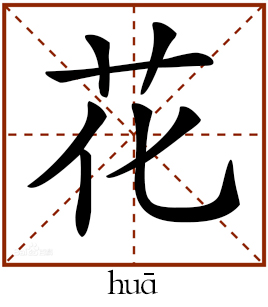Flower

This character usually refers to flowers. It can be used to describe floral items. The lanterns displayed on the night of the Lantern Festival are usually called hua deng (floral lanterns, literally), a type of artistic lantern mostly wood or metal framed, covered in gauze or glass, and painted with various motifs.
花市灯如昼
huā shì dēng rú zhòu
Hua shi refers to flower fairs. Visiting a flower fair during the Spring Festival has been a tradition for many places in southern China. Deng refers to lanterns and ru means “like.” Zhou refers to daytime. This term indicates that the flower fair is lit up by the lanterns bright as day.
This is a line from the poem, “The Lantern Festival” by Ouyang Xiu (1007–72), a great poet of the Song Dynasty who reintroduced the simple ‘ancient style’ into Chinese literature. “Last year at the Lantern Festival/ The flower-market lights were bright as day;/ When the moon mounted to the tops of the willows,/ Two lovers kept their tryst after the yellow dusk./ This year at the Lantern Festival/ The moon and the lights are the same as then;/ Only I see not my lover of yesteryear,/ And tears drench the sleeves of my blue gown” (trans. Robert Kotewell & Norman Smith).
Although the night of the Lantern Festival is usually cheerful, this poem is full of sadness. In ancient times, the Lantern Festival was not only about eating yuanxiao and appreciating lantern shows, it was also recognized as a significant celebration of romance, during which lovers courted each other. In the first half of the poem, Ouyang recalls a date with his lover on the night of the Lantern Festival the year before. The night was bustling with flocks of people, glittering with colorful lanterns. In a quiet corner the lovers met in a wonderfully romantic moment. However, this romantic love finishes on a more somber note in the last half of the poem. The view of the festival in the present is the same as then, but his lover has gone, leaving him alone among the noisy crowd of people. The enormous, engulfing waves of fun stand in sharp contrast to the sorrow and loneliness of the poet. Most believe that Ouyang composed this poem in 1036 to commemorate his second wife.
edited by REN GUANHONG
